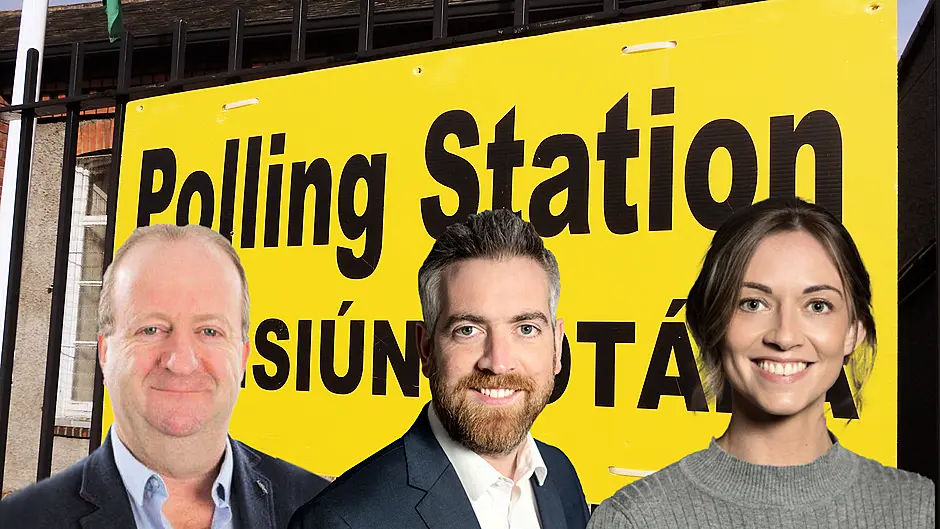We asked West Cork's three TDs to tell us how they were voting in the upcoming consititutional referenda, and why
ON March 8th, voters will have the opportunity to vote on two changes to our constitution on family and care. I am urging everyone to vote Yes to both. The first referendum relates to the definition of a family in our Constitution.
The current wording only recognises a family as one that is based on marriage. This does not reflect the reality of Ireland today, and does not recognise or protect a huge proportion of families in Ireland.
A total of 40% of families have non-married parents, be that in the form of co-parenting, single parents, or those that have been widowed. Marriage does not make a family. It is the relationships, the actions, the love and the care between people that form a family.
This change will not in any way undermine the value of marriage or traditional family structures. Instead it would acknowledge and validate the many forms of family that exist in modern Ireland. Ultimately we all want this amendment to result in every family in Ireland – in every shape and size they come in – to feel represented and protected by their Constitution.
The current wording should never have made its way into our Constitution in the first place, and it is high time it was changed.
The second referendum we will vote on relates to care, and to the removal of the notorious ‘women in the home’ section of our Constitution. To put it bluntly, the current wording in the Constitution is outdated, patriarchal and insulting. It doesn’t represent reality, it does not represent all women, and it needs to change.
A huge majority of full-time carers are women – 98% of them, 299,000 of which are unpaid. Caring responsibilities often make it incredibly difficult for women to progress in their careers.
The need for flexibility, part-time hours, and the implications of taking long career breaks to care for loved ones means that women are overrepresented in precarious and low paid employment.
Every single carer provides an essential service to this State. But Ireland does incredibly little to support them. From a lack of respite services to a lack of a public and affordable childcare model, the State often does the exact opposite, and makes life actively difficult and expensive for carers. It’s important to acknowledge that the wording the government has chosen to replace this provision with is not strong enough.
The Social Democrats had proposed alternative wording which would have recognised forms of care which take place outside of the home, as well as placing an obligation on the State to support carers. Instead the Government will ‘strive’ to support carers. This means there is no explicit requirement of the government to provide practical or financial support to carers.
While this is not as strong a step forward for carers as I would have liked, it is an improvement on the current wording of the Constitution.
Ultimately, in order to provide the necessary support for carers in Ireland, it is clear that we need a change in Government, not just a change in wording of our Constitution.

THE Constitution is a crucial document that should reflect our values as a society.
It is a foundational document that guides us as a people, embodying the principles and values that we hold dear. It is a reflection of who we are, as a nation and what we stand for.
It is not just a piece of paper, but a living, breathing document that evolves with us.
However, it is important to remember that the Constitution should not be used as a tool by the government or advocacy groups to further their own agendas. It should not be manipulated to serve the interests of those in power or those with the loudest voices.
The Constitution belongs to the people, to all of us, not just to those with the greatest access to power or the loudest voices in the room.
In this regard, the Constitution serves a dual purpose. It is not only something that protects us, safeguarding our rights and freedoms, but it is also something that we, as citizens, should protect.
We have a duty to defend its integrity whenever it is under threat.
Right now, I believe that our Constitution is facing such a threat. The government is proposing changes to the Constitution that I believe are harmful and detrimental to our society.
That’s why I’m urging everyone to vote ‘No’ on both proposals. The first proposal is about changing the definition of ‘family’ to include ‘durable relationships’.
This phrase is new and untested, and it’s unclear what it really means. It is marked by a level of legal, political, and cultural ambiguity that is startling in its lack of specificity. Even those who support the proposal admit this.
Some government ministers have said it could affect immigration and asylum claims, which is a serious concern. Government ministers have also said this change won’t protect polygamous relationships or ‘throuples’ (a trio in a non-monogamous relationship). But the truth is, they can’t guarantee this.
In our system, it’s the courts, not ministers, who decide what the law means. So, why are we being misled? Why is there a lack of transparency and honesty in this process?
The second proposal is about protecting work done in the home, especially by mothers. Some people wrongly say this limits women’s roles. But a Supreme Court judge, Susan Denham, clarified in 2001 that this law doesn’t restrict women to domestic roles.
It just recognises the important role of wives and mothers at home. Saying otherwise is misleading and should be rejected.
Constitutional debates don’t happen in isolation. They’re about trust. And I don’t trust this government or those pushing for these changes. So, let’s use our common sense and vote ‘No’ on both proposals on March 8th.
I’LL be voting ‘Yes’ and ‘Yes’ on both proposals which will be before the people on the 8th March to amend and modernise our Constitution.
I strongly believe that we should take this chance to recognise the evolving nature of families, eliminate the outdated references in our Constitution to the roles of women in society and acknowledge the invaluable contributions of all individuals, regardless of gender, within the family unit and in broader society.
Voting ‘Yes’ and ‘Yes’ in March would mark an important statement of inclusion in modern Ireland and represent an important recognition of a process of change which has been ongoing for up to 60 years.
As a party, Fianna Fáil is extremely proud of the 1937 Constitution which was introduced by Eamon de Valera. It was an important step in asserting the sovereignty of the Irish nation and protecting the rights of citizens. It is a living document. It is important to note that those who drafted the 1937 Constitution recognised this fact and made expressed provision in article 46, for a power to amend.
In 1937 there was a clear understanding that society could never just, stand still, could never remain static. To do so would undermine the potential of all societies present and future to make their mark.
It is not the job of the Constitution to address every issue of relevance to society – we must continue to make choices in elections and in governing.
However, it is right that we should want our Constitution to recognise the Ireland of today – it should explicitly acknowledge the more complex and inclusive society Ireland has today which we value greatly.
Removing the archaic and inappropriate reference to women in the current version of the Constitution is an important signal and is something which there has been widespread agreement on for decades.
The proposed wording on the role of caring in our society is a statement of values and an important guide for action. It reflects that all of us have a responsibility to recognise the vital role which caring for others plays in a strong society. And caring is important in many different situations.
To focus just on raising children is to have a very narrow view of caring in our society – we all care for older people, for people with disabilities and for those with serious illnesses.
The amendment both shows the respect and value which we as a society have for caring, and it also recognises that the state has a role to play in supporting care.
Providing a more inclusive wording for families is also a reflection of societal reality and it shows respect for diverse family units. No Constitution is ever static. The 1937 Constitution was never meant to be set in stone – its founders made provision for it to be altered according to the will of the people.
Voters will again have the power to update and modernise this living and breathing Constitution on the 8th of March. I urge people to get out and vote – and to vote ‘Yes’ and ‘Yes’.
What are the proposed changes?
The Family Amendment
The 39th Amendment to the Constitution will be on a white coloured ballot paper. It deals with Article 41.1.1°and Article 41.3.1° of the Constitution, both of which relate to the Family. In Article 41.1.1° “The State recognises the Family as the natural primary and fundamental unit group of Society, and as a moral institution possessing inalienable and imprescriptible rights, antecedent and superior to all positive law.” In Article 41.3.1° “The State pledges itself to guard with special care the institution of Marriage, on which the Family is founded, and to protect it against attack.” The Constitution currently recognises the centrality of the family unit in society and protects the Family founded on marriage.
The Proposal
In this amendment there is one vote for two proposed changes. The Proposal involves the insertion of additional text to Article 41.1.1° and the deletion of text in Article 41.3.1°. These proposed changes are shown below: Proposed to change Article 41.1.1° text in bold: Article 41.1.1° “The State recognises the Family, whether founded on marriage or on other durable relationships, as the natural primary and fundamental unit group of Society, and as a moral institution possessing inalienable and imprescriptible rights, antecedent and superior to all positive law.” Proposed to change Article 41.3.1° by deleting text shown with line through it: “The State pledges itself to guard with special care the institution of Marriage, on which the Family is founded, and to protect it against attack.”
The Care Amendment
The 40th Amendment to the Constitution will be on a green coloured ballot paper. It proposes deleting the current Articles 41.2.1° and 41.2.2° and inserting a new Article 42B. Article 41.2.1° “In particular, the State recognises that by her life within the home, woman gives to the State a support without which the common good cannot be achieved.” Article 41.2.2° “The State shall, therefore, endeavour to ensure that mothers shall not be obliged by economic necessity to engage in labour to the neglect of their duties in the home.” The Constitution currently, by Article 41.2, refers to the importance to the common good of the life of women within the home and that the State should endeavour to ensure that mothers should not have to go out to work to the neglect of their “duties in the home”.
The Proposal
In this amendment there is one vote for two proposed changes. The proposal involves deleting Article 41.2.1° and Article 41.2.2° and inserting a new Article 42B, as shown below: “The State recognises that the provision of care, by members of a family to one another by reason of the bonds that exist among them, gives to Society a support without which the common good cannot be achieved, and shall strive to support such provision.”










